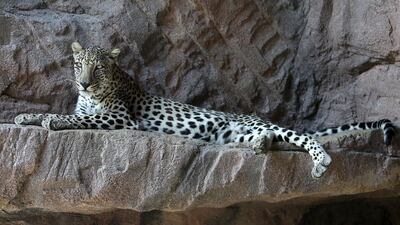ABU DHABI // Donors from the UAE, India, China and the United States have pledged a total of Dh293.8million for the conservation of large wild cats.
The 10-year initiative will work on protecting large cat species across the world and will be implemented through Panthera, a US-based conservation organisation founded in 2006.
Four philanthropists, including Sheikh Mohammed bin Zayed, Crown Prince of Abu Dhabi and Deputy Supreme Commander of the Armed Forces, have pledged an equal share of the total.
Also contributing were Jho Low, chief executive of Jynwel Capital and director of the Jynwel Charitable Foundation Limited, Hong Kong, Hemendra Kothari, chairman of DSP Blackrock India and the Wildlife Conservation Trust, and Dr Thomas Kaplan, chairman of the Electrum Group of companies and founder and chairman of Panthera.
The pledge was the first step in a campaign targeting US$200 million [Dh734.6m) for wild cat conservation, which, Dr Kaplan, explained, also helped to protect the animals that the large carnivores rely on for foods, as well as eco-systems as a whole.
“The big cats represent not only the iconic and the charismatic megafauna in the areas that they inhabit but they are a means by which one can effect landscape-wide conservation,” he said. “By saving the big cats, one can, with one step, save vast areas of precious, irreplaceable habitats around the world.”
The UAE’s contribution to the cause will be managed through the Mohammed bin Zayed Species Conservation Fund, which has already provided almost Dh40.4m for more than a thousand grass-roots conservation programmes around the globe in nearly five years.
The UAE’s Dh73.5 million contribution was on top of an endowment to the fund previously made by Sheikh Mohammed.
“Abu Dhabi yet again has demonstrated that it is a cornerstone of exchange between East and West and also as a bridge for working together to make the world a better place,” said Razan Al Mubarak, managing director of the fund.
Like the fund’s already established track record, the new programme will have a global impact, said Ms Al Mubarak, who is also the secretary general of the Environment Agency–Abu Dhabi.
“We are talking about the snow leopard in the Himalayas, we are talking about the tigers in the Far East and South-East Asia, we are talking about the cougars, the jaguars in the Americas, the cheetahs and lions and leopards in Africa,” she said.
Together with his wife, Dr Kaplan has also endowed the Recanati-Kaplan Centre at Oxford University’s Wildlife Conservation Research Unit.
“We anticipate that the Emirates will be able to be a beneficiary of the programme which was endowed by us at Oxford University in wildlife conservation management, so that the next generation of local Emirati wildlife conservation practitioners will be able to get the very best tools educationally, in order to be able to fulfil their mission,” said Dr Kaplan.
In the UAE and the rest of the Arabian Peninsular, projects to study and protect cats such as the Arabian leopard, can benefit from the initiative, said Dr Frederic Launay, acting director general of the Mohammed bin Zayed Species Conservation Fund. Populations of wild Arabian leopards still exist in the region – in Oman and Yemen – although they are not well studied, said Dr Launay. Even less is known about smaller local cat species such as the caracal and the sand cat.
“Certainly these are the types of species that we try to increase the ... projects we have around,” he said.
“The challenge here in the UAE, and in the region in general, is that we have got very few people who are actually working on those cat species.”
vtodorova@thenational.ae

